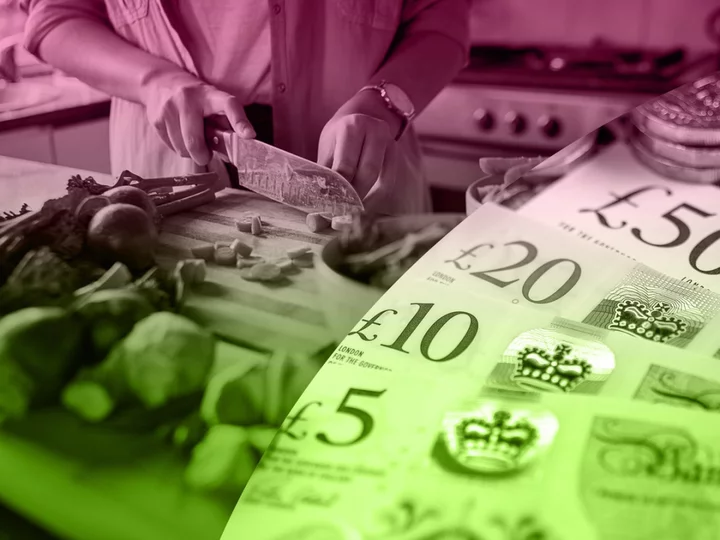As the cost-of-living crisis continues to bite, many of us are looking for ways to save money where we can.
Food shops are one of the main things that have become more expensive in recent years – so are there any easy ways to save a bit of cash in the kitchen?
Chefs are on hand to share their top money-saving tips…
Make simple swaps
Suzanne Mulholland, author of The Batch Lady: Cooking On A Budget (HQ, £22) recommends letting go of loyalty to brand names.
For example, she says: “You’re not going to notice a difference in flour – yet it’s about a fifth of the price of a branded one.”
Mulholland continues: “If you love to eat haddock, then buy hake instead. If you like to eat cod, buy coley instead – monkfish? Buy seacat. These are all very similar fishes, but they’re just not the most popular ones everybody else buys.
“You wouldn’t actually notice the difference between eating a different type of fish, because hake is very much like haddock – yet because it’s not that popular, it’s half the price. It’s also locally sourced, because these are all British fish.”
Maunika Gowardhan, author of Tandoori Home Cooking (Hardie Grant, £25), also advocates cost-effective swaps.
“If it’s a chicken recipe, I normally use chicken thighs over chicken breasts,” she says.
“It’s a cheaper cut of meat, and it’s a more flavourful cut of meat.”
If you’re a keen baker, The Great British Bake Off’s Kim-Joy (Bake Me A Cat, Quadrille, £16.99) has a top tip for you.
As butter “has become so much more expensive”, she recommends “using more vegetable oil in baking”.
Make a plan
“Most people are cooking blindly,” says chef Max La Manna (You Can Cook This!, Ebury Publishing, £22), “Pulling ingredients together and cooking – they do the same when they go to a supermarket, they buy ingredients – and a lot of waste happens when people don’t have a plan.”
La Manna’s top tip is firstly “cook the food you already have before you go out and buy more”. After that, it’s all about making a plan.
“Shop smarter,” says La Manna. “Create lists when you go to the supermarket, and stick to that list.”
Make your ingredients last longer
Throwing away produce that’s gone off is money down the drain – so La Manna is keen for us all to make ingredients last longer.
“You can extend the shelf life of ingredients – for instance, most people throw away bag salad or herbs,” he says. “What I do with my bag salad, once I bring it home I’ll wash it and also let it sit in cold water – because it firms up and it gets crisp and it stays fresh a little longer.”
Once he’s washed the salad, he divides the bag of leaves – putting half in a container in a tea towel (“to absorb some of the moisture”) and use within the next three or four days. “The other half I cook in hot water – blanch it really quickly, squeeze out the water, then I have this kind of pre-cooked spinach. Roll that up tightly, place it in the freezer and then when I need something in a week’s time – a stew, a soup, a curry, a stir-fry – pop those in.”
You can also reduce waste by knowing how to store all your other produce properly. “That’s where a lot of waste is coming in, people put ingredients away, they turn their back and the food’s already gone bad,” says La Manna.
“Know how to store your produce and where to store it – potatoes should be kept in a cupboard somewhere dry, dark, cool but well-ventilated so they don’t begin to sprout. Same thing with onions. Bananas like to have their own space – bananas don’t like to be with other ingredients, because they release a chemical and will ripen quicker.”
Instead of throwing away bananas on the turn, La Manna says: “It’s great for the freezer, [or] use them in smoothies. Use them as a batter for cupcakes or cakes.”
Use every part of your ingredients
“With Chinese food, there really is a ‘no waste’ policy,” says Kwoklyn Wan (One Wok, One Pot, Quadrille, £16.99) – and he suggests this ethos could help you save money in the kitchen.
“Even when you peel your onions, use the onion skin in the stock” – along with anything else you might normally throw away, such as the top ends of carrots or fish heads.
“That’s so important – if people learn to use every part of that ingredient… You can have a fantastic dish with all the best bits, and at the end of it, you’ve got this fantastic soup base. All you’ve got to do is add really cheap noodles into it, and maybe a few veggies and tofu, some chicken – whatever.
“You’ve got this lovely broth – and that’s your next meal completely free, or near enough.”
Be smart with your ingredients
Most of us are guilty of buying an exciting-sounding ingredient for our store cupboard and only using it once. If you really want to save money in the kitchen, it’s all about being smart with what you buy – and making sure you’re going to use it a lot.
Lydia Vernon, co-author of Caught Snackin’ (Hamlyn, £20), says that on Caught Snackin’s wildly popular TikTok channel,”we like to keep with the same ingredients for each recipe.
“We stay around things like mixed herbs, garlic powder, plain flour – those kind of staples you have in your cupboard all the time, which are going to be cost-effective.”
Food writer Gurdeep Loyal (Mother Tongue, Fourth Estate, £26) takes this one step further, saying: “My advice would be to equip your pantry with four or five very flavour-forward ingredients – things such as tamarind paste, things such as brown miso, things such as fennel seeds, for example, or something like tandoori masala powder.
“Because these four or five pantry staples can transform anything really simple and basic – just adding a spoonful of this is going to amplify your cooking into hundreds of different directions.
“It means you can use very basic supermarket staples, then turn them into something incredible” – without having to spend money on fancy new ingredients every week.
Read MoreThe dish that defines me: Mallini Kannan’s baked honey-soy salmon
Breakfast for dinner and four other things you should cook this week
Money-saving chilli con carne that absolutely slaps with flavour
How to pimp up your instant ramen (and save money)
Do it for the Gram: Speedy but spectacular goat’s cheese linguine
Where to find the best Guinness in London – and how to spot a bad one









